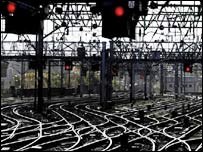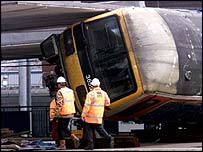|
Ever since the Hatfield disaster three years ago and the Potters Bar derailment last May, there have been calls for track maintenance contracts to be taken back in-house.

Network Rail believes £300m a year can be saved on track maintenance
|
Many claim that the fact maintenance work had been contracted out to private engineering companies meant that standards had been allowed to slip.
The decision by Network Rail to take back these contracts is the culmination of a six-month review of maintenance procedures.
Earlier this month, Jarvis - the company involved in the Potters Bar crash - agreed to pull out of maintenance.
This latest decision involving the remaining six contractors is the logical conclusion to that process.
The original idea behind contracting maintenance out to the private sector was to introduce private sector efficiencies as a way of cutting costs.
Maintenance work under the old British Rail was wasteful and expensive.
High-profile accidents
Telling companies they would lose their contracts if they did not meet certain standards - both in terms of cost and safety - seemed to be a good way of keeping costs down.
But it has become clear that the arrangement wasn't working.
Not only were there several high-profile accidents in which shoddy standards were blamed, but costs were not being cut by as much as had been hoped.

Safety has been a key issue since the Potters Bar crash
|
The decision-making process had become too clumsy and it had become hard to exercise direct control over the contractors.
Network Rail says duplication and varying standards were adding about £300m a year to the cost of maintenance.
For example it discovered that two contractors working in adjacent regions were charging hugely differing rates for the same job.
Network Rail managers were having to supervise the work of contractors, who also had their own supervisors.
And if it transpired that a particular area needed more workers, Network Rail couldn't just move workers from place to place, because they were employed by different companies.
So why not take track renewals in-house too? The answer from Network Rail is that the two procedures are rather different.
Track maintenance involves the day-to-day upkeep of existing sections of track.
Renewal involves replacing old track with new track - it is a much heavier, more specialised job.
|

~RS~q~RS~~RS~z~RS~38~RS~)

~RS~q~RS~~RS~z~RS~38~RS~)
Bookmark with:
What are these?